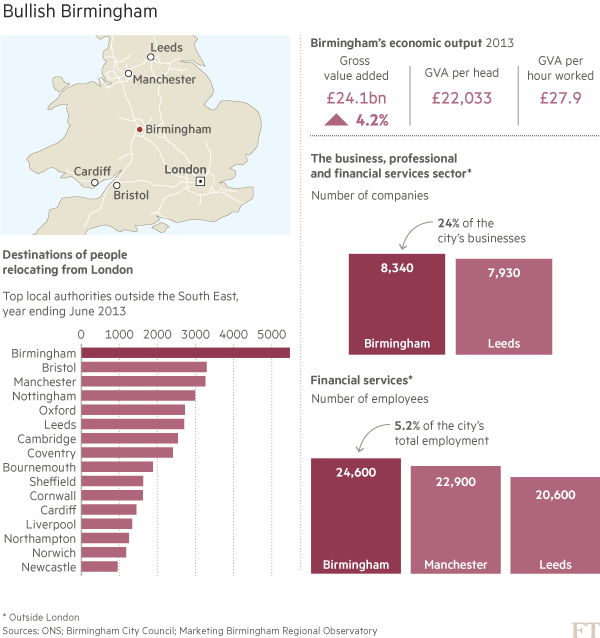Skills and land shortages hold back West Midlands car industry
Roula Khalaf, Editor of the FT, selects her favourite stories in this weekly newsletter.
When Aston Martin launched its DBX off-roader at this year’s Geneva motor show, thoughts quickly turned to where the luxury model would be built.
Sadly for British manufacturing, the new factory had just as much chance of being in Birmingham, Alabama, as in the West Midlands’ automotive heartland.
The 102-year-old carmaker is hemmed in at its Warwickshire headquarters by expanding neighbour Jaguar Land Rover (JLR), as well as residential development and protected greenbelt land.
Aston Martin’s partner and shareholder Daimler, meanwhile, has a plant in the south of the US, which has a growing carmaking community and chain of parts suppliers.
Besides, what region of the world would not be prepared to offer incentives for such a name as Aston Martin?
The dilemma underlines the weaknesses of manufacturing in central England. “A major issue facing the West Midlands’ auto industry is one of shortage of skills and of land,” says David Bailey, professor of industrial strategy at Aston Business School.
The Midlands is home to some of the UK’s finest automotive exporters, not just JLR and Aston Martin, but also BMW’s Hams Hall engine plant and the London Taxi Company, the Coventry-based maker of the black cab. Ten years after the collapse of MG Rover, the region has staged a powerful comeback, and is the only part of the UK with a trade surplus with China.
But companies rushing either to expand or reshore manufacturing activities are faced with a decreasing pool of talent and industrial sites, says Prof Bailey. That is starting to turn manufacturers away. Aston Martin is considering 10 locations and expects to reach a decision at the end of this month on its new factory, which could still be in the UK. JLR too, is expanding in the UK, pledging to double the size of its Coventry headquarters and last year opening an engine plant in Wolverhampton.
But the Indian-owned company has unveiled plans to build about 300,000 cars a year in Slovakia, starting in 2018. For union officials, that decision had discomfiting echoes of Peugeot’s decision to open a plant in eastern Europe — a move that prefaced the French carmaker’s withdrawal from manufacturing in the UK.
Prof Bailey says policymakers should look at allowing the “development of greenbelt land so as to boost availability and the creation of manufacturing jobs”. But local authorities are under increasing pressure to release land for housing, as the UK seeks to address a chronic shortage of homes. Plans are being laid for a 2,000-home estate on Aston Martin’s doorstep in Gaydon.
“There are competing interests for greenbelt land between residential and industrial,” says a person close to the company.
It is not just land supply that worries big manufacturers. On top of a strong pound, which was partly blamed for the closure of a Wolverhampton tyre factory in June, exporters are struggling with skills supply.
JLR, for instance, has rampant demand for trained engineers — so much so that it has to do a lot of the work for itself in its academy. “We are 36,000 people in the company, but more than 8,800 [of them] are in training. Can you imagine?” says Ralf Speth, JLR chief executive. “We offer everything from apprenticeships to PhDs.”
But JLR’s efforts to employ more skilled engineers are taking vital skills from other companies in the region.
Many supply chain companies are already struggling to achieve the scale demanded by modern car manufacturers who build vehicles on platforms that share common parts. Of the automotive employers in the West Midlands region, 90 per cent have fewer than 100 staff.
Daniel Hirsch, a manufacturing expert from PA Consulting, which advises the industry, says: “This has become a big issue for JLR, because suppliers haven’t grown with it, so it has to order a significant amount of parts from other countries and ship them to the UK — from Morocco and the Balkans.”

As JLR continues to strive to match its German rivals, its quality demands ratchet up, further straining domestic suppliers. The company is also shifting its focus to overseas plants in China and Brazil, which acts as a disincentive for domestic suppliers to tool up and invest.
The overseas expansion “means the suppliers in the Midlands get only a part of the additional volume JLR is bringing to market, which makes them careful with their investment strategy”, says Mr Hirsch.
But future technologies offer opportunities for the region’s suppliers, as well as its universities.
The Warwick Manufacturing Group (WMG), a part of the University of Warwick, led by Lord Bhattacharyya, will lead a project to set up a £14m UK car battery pack research facility.
WMG and Warwick’s Advanced Propulsion Centre will form part of what Prof Bailey calls a “phoenix industry” of low-carbon technologies.
The London Taxi Company will make its hybrid TX5 cab at a new plant in Coventry, working with local electric van maker Emerald Automotive.
Comments